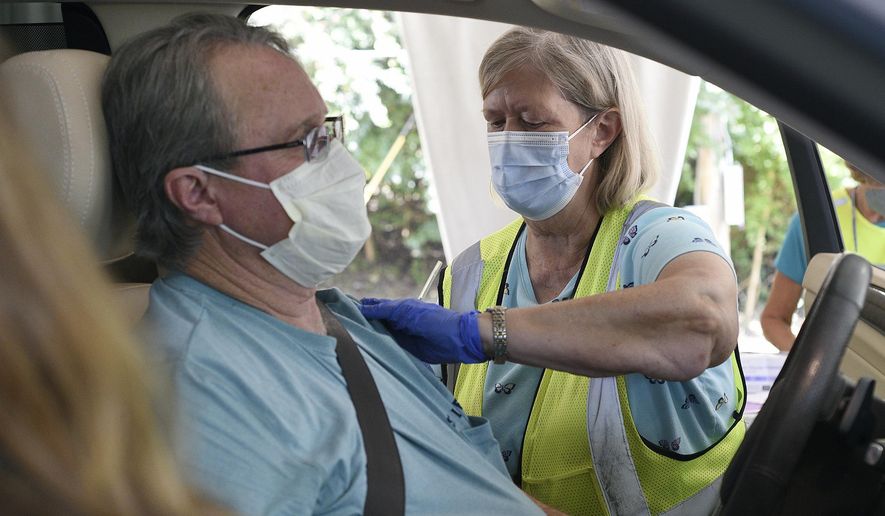NASHVILLE, Tenn. (AP) - Tennessee Gov. Bill Lee signed a wide-reaching bill Friday strictly limiting what governments and businesses can require to address the COVID-19 pandemic, while industry groups push for changes, local officials ask a court what happens now to school mask orders, and various entities look into how to become exempt.
The Republican’s signature, which he promised earlier in the week, puts the new law into effect immediately, largely barring governments and businesses from requiring proof of COVID-19 vaccinations, and only letting public entities - including schools - require masks due to COVID-19 in rare, dire public health scenarios.
The law also puts Tennessee at odds with President Joe Biden’s requirement for workers at larger employers to get a COVID-19 vaccine by Jan. 4 or face rigorous COVID-19 testing, which a federal appeals court has paused for now amid legal challenges. Republican lawmakers cited the federal vaccine requirement as the main reason they called themselves into a three-day special session and Lee has criticized Biden’s order as well.
Even before the law was enacted, prominent business groups were calling for changes when lawmakers return in January - though GOP legislative leaders don’t appear to have budged on what they have passed so far. The Tennessee Chamber of Commerce and Industry and the National Federation of Independent Business of Tennessee are particularly opposed to the law’s enforcement-through-lawsuits strategy, which puts companies at risk of being sued while they try to navigate conflicting state and federal requirements on vaccine requirements.
Lee has said “there are some issues we need to work through” with the legislation. Lee mentioned a provision in which hospitals will be required during the COVID-19 pandemic to allow at least one family member to stay with a patient if the family member does not have and is not showing symptoms of COVID-19 or another virus or communicable disease. Lee said his understanding is that the intent was to limit that visitation change to only end-of-life COVID-19 situations.
But his signature puts the law into effect as is.
Some companies and higher education institutions have already reached out about being exempt from the requirements, which a section of the law allows if companies or governments could lose federal funding, according to the comptroller’s office, which will field those requests. The comptroller will have an online form up and running for exemption applications by Monday, spokesperson John Dunn said.
The bill passed last month after lawmakers met behind closed doors for hours when manufacturers including Ford Motor Co. - for whom lawmakers had just approved an economic development package for a massive new Tennessee electric vehicle and battery production project - expressed opposition to the limitations on business mask mandates.
In the dark of the night, Republicans relented and carved private businesses out of stringent mask restrictions.
In public schools, meanwhile, the new, tight limitations on mask requirements left enough uncertainty that officials have asked a federal judge for clarity. The governor has ordered school districts with mask requirements to let parents opt their students out of wearing them, and the order is still in effect. In separate lawsuits, federal judges in Tennessee’s three court districts have blocked the order from applying in three counties.
Under the new law, however, schools and other government entities would only be allowed to require masks if they lived in a county with a rolling average 14-day COVID-19 infection rate of at least 1,000 per 100,000 residents while the state is under a state of emergency. No counties in the state meet that threshold.
Beyond that, mask mandates would continue to be limited in use, with medical and religious exemptions required. The school’s principal would have to request the mandate to the school board. If approved by the board, the mandate could only apply to that particular school - not the whole school district - up to 14 days.
Once Lee promised to sign the law, officials in Shelby County, which includes Memphis, asked a judge to weigh in about what they are supposed to do now, given the new law and that the state has appealed her decision to block the mask opt-out order. Judge Sheryl Lipman said Friday she will address the questions to some degree in an order. Brice Timmons, an attorney representing children with disabilities who are plaintiffs in the lawsuit, indicated he will ask a Nashville federal judge to block the education components of the new law.
Shelby County officials also asked about the effect of another bill passed by lawmakers that removes authority of six large county health departments to issue orders stricter than the governor’s during a pandemic state of emergency.




Please read our comment policy before commenting.